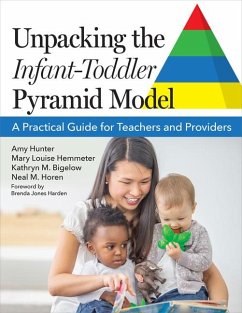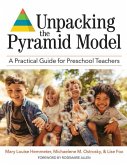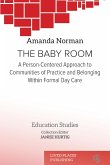Amy Hunter, Mary Louise Hemmeter, Kathryn M Bigelow, Neal M Horen
Unpacking the Infant-Toddler Pyramid Model
A Practical Guide for Teachers and Providers
Amy Hunter, Mary Louise Hemmeter, Kathryn M Bigelow, Neal M Horen
Unpacking the Infant-Toddler Pyramid Model
A Practical Guide for Teachers and Providers
- Broschiertes Buch
- Merkliste
- Auf die Merkliste
- Bewerten Bewerten
- Teilen
- Produkt teilen
- Produkterinnerung
- Produkterinnerung
"[Excerpt]: The highly anticipated follow-up to Unpacking the Pyramid Model, this one-of-a-kind book is the first to provide a comprehensive, step-by-step overview of the widely used Pyramid Model Practices for infants and toddlers from birth to three. With this accessible training guide, teachers and providers will use research-based practices to meet the unique needs of infants and toddlers-and boost their social-emotional development in the critical first years of life"--
Andere Kunden interessierten sich auch für
![Unpacking the Pyramid Model: A Practical Guide for Preschool Teachers Unpacking the Pyramid Model: A Practical Guide for Preschool Teachers]() Unpacking the Pyramid Model: A Practical Guide for Preschool Teachers55,99 €
Unpacking the Pyramid Model: A Practical Guide for Preschool Teachers55,99 €![On Being and Well-Being in Infant/Toddler Care and Education On Being and Well-Being in Infant/Toddler Care and Education]() Mary Benson McMullenOn Being and Well-Being in Infant/Toddler Care and Education40,99 €
Mary Benson McMullenOn Being and Well-Being in Infant/Toddler Care and Education40,99 €![The Encyclopedia of Infant and Toddler Activities, Revised The Encyclopedia of Infant and Toddler Activities, Revised]() Donna WittmerThe Encyclopedia of Infant and Toddler Activities, Revised20,99 €
Donna WittmerThe Encyclopedia of Infant and Toddler Activities, Revised20,99 €![Infant and Toddler Development from Conception to Age 3 Infant and Toddler Development from Conception to Age 3]() Mary Jane Maguire-FongInfant and Toddler Development from Conception to Age 344,99 €
Mary Jane Maguire-FongInfant and Toddler Development from Conception to Age 344,99 €![On the Teaching of English Reading: With a Running Commentary on the Dale Readers - Steps to Reading; First Primer; Second Primer; Infant Reader On the Teaching of English Reading: With a Running Commentary on the Dale Readers - Steps to Reading; First Primer; Second Primer; Infant Reader]() Nellie DaleOn the Teaching of English Reading: With a Running Commentary on the Dale Readers - Steps to Reading; First Primer; Second Primer; Infant Reader24,99 €
Nellie DaleOn the Teaching of English Reading: With a Running Commentary on the Dale Readers - Steps to Reading; First Primer; Second Primer; Infant Reader24,99 €![The Principles and Practice of Early and Infant School Education The Principles and Practice of Early and Infant School Education]() James CurrieThe Principles and Practice of Early and Infant School Education26,99 €
James CurrieThe Principles and Practice of Early and Infant School Education26,99 €![The Baby Room The Baby Room]() Amanda NormanThe Baby Room24,99 €
Amanda NormanThe Baby Room24,99 €-
-
-
"[Excerpt]: The highly anticipated follow-up to Unpacking the Pyramid Model, this one-of-a-kind book is the first to provide a comprehensive, step-by-step overview of the widely used Pyramid Model Practices for infants and toddlers from birth to three. With this accessible training guide, teachers and providers will use research-based practices to meet the unique needs of infants and toddlers-and boost their social-emotional development in the critical first years of life"--
Hinweis: Dieser Artikel kann nur an eine deutsche Lieferadresse ausgeliefert werden.
Hinweis: Dieser Artikel kann nur an eine deutsche Lieferadresse ausgeliefert werden.
Produktdetails
- Produktdetails
- Verlag: Brookes Publishing Company
- Seitenzahl: 208
- Erscheinungstermin: 13. Dezember 2024
- Englisch
- ISBN-13: 9781681258591
- ISBN-10: 1681258595
- Artikelnr.: 71205626
- Herstellerkennzeichnung
- Libri GmbH
- Europaallee 1
- 36244 Bad Hersfeld
- gpsr@libri.de
- Verlag: Brookes Publishing Company
- Seitenzahl: 208
- Erscheinungstermin: 13. Dezember 2024
- Englisch
- ISBN-13: 9781681258591
- ISBN-10: 1681258595
- Artikelnr.: 71205626
- Herstellerkennzeichnung
- Libri GmbH
- Europaallee 1
- 36244 Bad Hersfeld
- gpsr@libri.de
> Previously, Amy served in many positions at ZERO TO THREE: National Center for Infants, Toddlers, and Families, including as Director of Program Operations for the Early Head Start National Resource Center and Project Director for the Infant Toddler Center on the Social Emotional Foundations of Early Learning project. For 20 years, Amy has been involved in early childhood mental health, including providing training and technical assistance on early childhood mental health consultation to individuals and groups around the country. Mary Louise Hemmeter, Ph.D., is Professor in the Department of Special Education at Vanderbilt University. Her research focuses on effective instruction, social-emotional development, challenging behavior, and on coaching teachers. She has been a principal investigator (PI) or co-PI on numerous projects funded by the U.S. Departments of Education and Health and Human Services. Through her work on the National Center on Social Emotional Foundations for Early Learning and Institute of Education Sciences (IES)-funded research projects, she was involved in the development of the Pyramid Model for Supporting Social Emotional Competence in Young Children and practice-based coaching, a model for supporting teachers in implementing effective practices. She is currently the PI on on an IES-funded development project on programwide supports for implementing the Pyramid Model, a co-PI on an IES developmental project on implementing the Pyramid Model in infant-toddler settings, and a co-PI on an IES efficacy study examining approaches to supporting teachers in implementing embedded instructions. She is a co-author on the Connect4Learning Early Childhood Curriculum and the Teaching Pyramid Observation Tool (TPOT(TM)). She was a coeditor of the Journal of Early Intervention and President of the Council for Exceptional Childrenâ (TM)s Division for Early Childhood (DEC). She received the Merle B. Karnes Service to the Division Award and the Mary McEvoy Service to the Field Award. Kathryn Bigelow, Ph.D., is an Assistant Research Professor at the Juniper Gardens Children's Project in the Institute for Life Span Studies at the University of Kansas. Her research focuses on interventions for culturally and linguistically diverse children and families experiencing multiple risks. Specifically, her work has addressed early childhood language and social-emotional development and the translation of evidence-based interventions for parents, care providers, home visitors, and early intervention providers within both center-based and home-based early childhood education programs. Dr. Bigelow's work in these areas maintains an emphasis on implementation fidelity, and how technology can promote engagement and enhance the implementation of evidence-based intervention. She has been the PI or Co-PI on projects focusing on child language promotion, and on parent engagement in home visiting. Currently, she directs, with Drs. Carta, Irvin, and Hemmeter, an Institute of Education Sciences-funded (IES) research project focused on developing the Infant-Toddler Pyramid Model, a three-tiered model to promote social-emotional outcomes for infants and toddlers, based on the TPITOS. Dr. Neal M. Horen is a clinical psychologist who has focused on early childhood mental health for the last twenty years. He is Director of the Early Childhood Division for the Georgetown University Center for Child and Human Development. Dr. Horen has worked closely with all 50 states, numerous tribes, territories, and communities in supporting their development of systems of care for young children and their families. He is the co-director of the Head Start National Center on Health, Behavioral Health and Safety, director of the Center of Excellence for Infant and Early Childhood Mental Health Consultation, the Infant Early Childhood Mental Health TA Center, co-director of the National Training and Technical Assistance Center for Childrenâ (TM)s Mental Health, and Georgetown lead for the MIECHV TA Center, the HRSA Evidence to Impact Center, the Early Childhood Comprehensive Systems TA Center and the Early Intervention Personnel Center. In that capacity he has delivered hundreds of trainings across the country and has co-led development of nationally recognized materials. He leads Georgetownâ (TM)s Early Childhood Mental Health Certificate programs and has helped to developed innumerable materials related to infant and early childhood mental health consultation including books, training guides, evaluation guides, monographs and he also continues to be active in providing mental health consultation as part of his clinical practice. In addition, Dr. Horenâ (TM)s primary interest is in early childhood mental health and he has lectured extensively on infant and early childhood mental health, challenging behaviors in young children, social skills development, as well as the impact of trauma on child development. Dr. Lindsey Allard Agnamba advises partners and the internal SRC team in ensuring that SRCâ (TM)s work supports equity-focused improvement of early childhood systems and programs. Lindsey holds a Doctorate in Educational Leadership from the University of Pennsylvania, an M.Ed. in Education Policy with a focus on Equality of Opportunity from the Harvard Graduate School of Education, and a B.S. in Human Development/Early Childhood Education from Wheelock College. Dr. Rosemarie Allen's life's work is centered on equity and justice for historically marginalized communities. She is an Associate Professor at MSU Denver and the President and CEO for the Institute for Racial Equity & Excellence (IREE). Rosemarie is a national expert on implicit bias and culturally responsive practices, speaking at conferences across the country and as a "Global Leader" connecting with world leaders around the world. Dr. Kathleen Artman Meeker's work focuses on coaching, professional development, and teaching practices that promote young children's social-emotional development. She is particularly interested in the ways early learning programs structure coaching in creative and equitable ways to support infant, toddler, and preschool educators. Dr. Erin Barton is owner and lead consultant at Barton Consulting in Nashville, Tennessee. She is an international educational consultant and an active scholar with over 120 publications in major journals, multiple chapters, and several textbooks related to evidence-based practices. Dr. Barton serves on several editorial boards and is the Editor-in-Chief of Topics in Early Childhood Special Education and an Associate Editor for the Journal of Early Intervention and Remedial and Special Education. She has received many honors including the 2019 Merle B. Karnes Award for Service to the Division for Early Childhood and the 2017 Distinguished Early Career Research Award from the Division for Research of the Council for Exceptional Children. Dr. Sarah Behrens is a Social Worker for the Shawnee Mission School District Early Childhood Education Center. She coordinates a variety of projects promoting an inclusive and equitable education for young children and their families. She has led state and national trainings on collaborative autism diagnostics and promoting early identification. Her training and scholarship focus on the promotion of social emotional development and developmental monitoring in early childhood settings with families of young children. At SRC, Jennifer provides leadership in the areas of racial equity-focused professional learning, technical assistance, and strategic advising. Prior to her work at SRC, Jennifer had over 10 years of experience in child care, Head Start, and Even Start programs, and coordinating community-based initiatives impacting young children and their families. Jennifer earned an M.Ed. in Early Childhood Education from Towson University and a B.S. in Early Childhood Leadership from Stevenson University. Judith J. Carta, Ph.D., is a Senior Scientist in the Institute for Life Span Studies, Professor of Special Education, and the Interim Director of the Juniper Gardens Children's Project at the University of Kansas. Her research focuses on developing strategies to minimize the effects of poverty on children's outcomes, designing practices that teachers and parents can use to promote children's early learning and social-emotional development, methods for monitoring the progress of young children, and strategies for promoting family engagement in early intervention programs. She has been the PI of several multi-site research projects and centers funded by the National Institutes of Health, the Institute of Educational Sciences, and the Administration on Children and Families. She currently co-directs an IES-funded project to develop the Infant-Toddler Pyramid Model, a three-tiered model to promote social-emotional outcomes for infants and toddlers, based on the TPITOS. She was a member of the Federal Advisory Panel on Head Start Research and Evaluation, Division of Early Childhoodâ (TM)s Commission on Recommended Practices, and served as the Editor of Topics in Early Childhood Special Education as well as the boards of numerous scientific journals. She received the Mary E. McEvoy Service to the Field Award from the Division for Early Childhood. Dr. Gounah Choi is a lecturer in the Department of Special Education and Clinical Sciences at the University of Oregon. As a former special education teacher, she has worked with young children with developmental delays/disabilities in home, public/private school, and clinic. Her research interest is in parent-implemented interventions for social-emotional learning of children with disabilities, particularly those from underrepresented communities. Mallory Eddy has been a member of the Pyramid Model Resources for Infantâ "Toddler Social Emotional Development (PRISM) team at Juniper Gardens Children's Project at the University of Kansas since 2019. Currently, she is completing her master's degree in Applied Behavioral Science at KU. Mallory's primary research interests include social emotional development for young children and coaching for family child care providers. Sarah Feldmiller is an Early Interventionist for Missouri First Steps. In her time at Juniper Gardens Children's Project, she has facilitated many projects focusing primarily on early childhood development and supporting young children with Autism Spectrum Disorder. At Juniper Gardens, Sarah has served in the roles of coordinator, researcher, Pyramid Model coach, and implementer across a variety of projects. Sarah received her master's degree in Early Childhood Special Education from Teacher's College at Columbia University. After spending time as an Early Childhood Special education classroom teacher, she moved on to provide services through Early intervention in the state of Missouri. Angel Fettig, Ph.D., is an associate professor at the University of Washington, Seattle. Dr. Fettigâ (TM)s research focuses on supporting social-emotional development and reducing challenging behaviors for young children with or at risk for disabilities. Specifically, she examines factors that influence implementation and intervention fidelity for education professionals and caregivers in implementing evidence-based practices that reduce challenging behaviors. Dr. Lise Fox is a professor in the Department of Child and Family Studies at the University of South Florida in Tampa, Florida, and is Co-Director of the Florida Center for Inclusive Communities: A University Center for Excellence in Developmental Disabilities. Dr. Fox is one of the developers of the Pyramid Model for Promoting Social Emotional Competence in Infants and Young Children and has authored 95 books, book chapters, and articles. She has developed and managed numerous technical assistance, research, model demonstration, and personnel preparation projects in the areas of early childhood special education, state capacity building, implementation of the Pyramid Model, preventing and addressing challenging behavior, and Positive Behavior Support. She is the director of the National Center for Pyramid Model Innovations. Dr. Jessica K. Hardy is currently Assistant Professor in the Department of Special Education at the University of Illinois at Urbana-Champaign. Dr. Hardy received her doctorate in early childhood special education from Vanderbilt University and her M.Ed. and BA from the University of Florida. She taught in Portland, Oregon, as a Head Start teacher and an early childhood special education teacher. Dr. Hardyâ (TM)s primary research interests are evidence-based instructional practices and early childhood coaching and professional development. Dwight W. Irvin, Ph.D., is an Assistant Research Professor at the Juniper Gardens Children's Project in the Life Span Institute at the University of Kansas Medical Center. He was a Response to Intervention (RTI) in Early Childhood Postdoctoral Fellow at Juniper Gardens Children's Project and a Postdoctoral Scholar in Department of Education Leadership at the University of Kentucky. His research focuses on the use of wearable sensors to better understand the link between adult-child and child-peer interactions and the social competence of young children at-risk for or with identified disabilities in the classroom, home and community. Dr. Gospel Kim's scholarship focuses on caregiver coaching and early intervention to support the social, communication, and emotional development of young children with or at a high likelihood of autism and other developmental disabilities. Additionally, she is interested in identifying and disseminating evidence-based practices for families and teachers to support young children with behavioral support needs in typical settings. Tara Lynn works with Dr. Mary Louise Hemmeter. Tara holds a master's degree in social work from Baylor University. She currently provides training and ongoing coaching supports to early childhood programs and has coached on the Pyramid Model for infants and toddlers. Tara also has experience working as an early interventionist providing a play-based social communication intervention to young children. Ashley MacNish is an Educational Consultant at Vanderbilt University in Nashville, Tennessee, and a staff member at the National Center for Pyramid Model Innovations (NCPMI). She provides training, technical assistance, and ongoing coaching supports to build capacity for implementing Pyramid Model in early intervention, infant toddler, and PreK programs. Ashley has practiced as an early childhood special education teacher and as an early intervention provider. Her professional interests include training and support to early intervention providers supporting caregiver-child interactions, social emotional competence, practice-based coaching, and technical assistance to states and programs implementing Pyramid Model in early intervention settings. Kelli McDermott is a Licensed Independent Clinical Social Worker (LICSW) with specializations in trauma and interpersonal violence and early childhood mental health. She has worked with young children, their families, and early childhood education centers to develop strengths-based, relational, and environmental supports to foster resilience during this critical developmental stage. She is currently a faculty member at Georgetown University and part of the training and technical assistance team for the Office of Head Start funded National Center on Health, Behavioral Health, and Safety. Additionally, she supports Pyramid Model implementation in a variety of settings through her membership of the Pyramid Model Master Cadre in Massachusetts. Dr. Michaelene M. Ostrosky is Grayce Wicall Gauthier Professor of Education and Head of the Department of Special Education at the University of Illinois at Urbana-Champaign (UIUC). She has been involved in research and dissemination on the inclusion of children with disabilities, social-emotional competence, and challenging behavior. Through her work on the national Center on the Social Emotional Foundations for Early Learning she was involved in the development of the Pyramid Model for Supporting Social Emotional Competence in Young Children. Professor Ostrosky is a former editor of Young Exceptional Children (YEC) and the co-editor of several YEC monographs. She co-authored the Making Friends book (2016), which supports the acceptance of individuals with disabilities, and The Project Approach for All Learners (2018). Professor Ostrosky has been recognized for her professional accomplishments with honors such as UIUC University Scholar, Goldstick Family Scholar, College of Education Senior Scholar, and the Division of Early Childhood of the Council for Exceptional Childrenâ (TM)s Award for Mentoring. Julia Sayles is a Licensed Mental Health Clinician (LMHC) who has spent the last decade serving early childhood populations through direct clinical work, training and technical assistance, and product development. Julia is a research instructor at Georgetown University where she supports infant and early childhood systems of care work as well as training and technical assistance for the Head Start Center on Health, Behavioral Health, and Safety. Julia is a staff member for the National Center for Pyramid Model Innovations and a member of the Pyramid Model master cadre for Massachusetts where she supports Pyramid Model implementation across a variety of settings. Dr. Schnitz is Assistant Research Professor at Juniper Gardens Childrenâ (TM)s Project. Dr. Schnitzâ (TM)s line of inquiry focuses on supporting pre- and in-service teachers to implement evidence-based practices and families to promote social-emotional competence and address challenging behaviors in young children. Alana evaluated the efficacy of the Positive Solutions for Families Intervention for her dissertation and has worked on research projects related to the Pyramid Model for more than 10 years. Dr. Abby Taylor is an assistant professor at the University of West Georgia, focusing her teaching and scholarship on early childhood special education. She has been a toddler teacher in an inclusive lab school and a coach to teachers on the Pyramid Model for infants and toddlers and to child care programs supporting program-wide Pyramid Model implementation. Dr. Taylorâ (TM)s passion is is supporting teachers to provide social-emotional instruction and targeted supports to all children. Kristin Tenney-Blackwell has been working with children, families and educators for over twenty years and is passionate about promoting the well-being of young children and the adults who care for them. In addition to her private practice and clinical focus, her portfolio includes work in national- and state-level early childhood education and mental health initiatives, in addition to reflective consultation and supervision, training, resource development, research, and evaluation of early childhood projects. Crystal Williams is a doctoral candidate at the University of Illinois and a National Center on Pyramid Model Innovations (NCPMI) fellow. She has worked as an infant‐toddler teacher, Early Head Start Coach, and an early intervention provider. Her research focuses on infants and toddlers with significant support needs, family members' roles in their children's development, and how early intervention services support families. Dr. Marina Velez completed her degree in Special Education at Vanderbilt University in 2021. Dr. Velez has spent 10 years coaching parents and teachers in strategies to support the development of prosocial and emotion regulation skills in children. Dr. Yates recently retired from the Special Education Department at the University of Illinois. She has continued to work on grant-funded projects at the University of Illinois and Vanderbilt University. She is a member of the Pyramid Model Consortium Faculty and has been involved with materials development and training around the Pyramid Model for more than 20 years. Dr. Yates has focused her work primarily on social-emotional competence, caregiver-child interaction, and early literacy.








